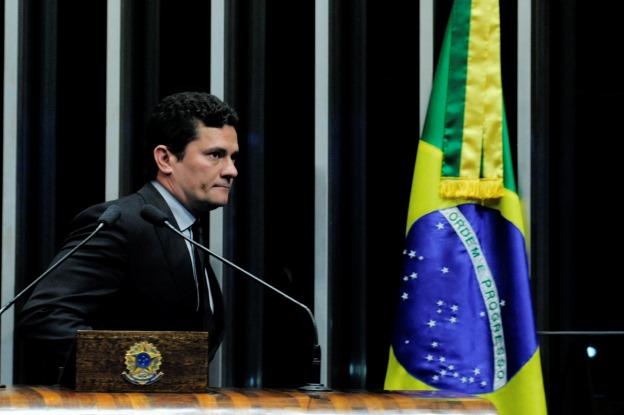When Sérgio Moro visited Washington, D.C. last July, the 44-year-old judge overseeing Brazil’s “Car Wash” corruption investigation was greeted with standing ovations and adoring questions. “Will you please run for president?” one Brazilian executive pleaded. “What advice would you give so we can have a ‘Car Wash’ in Mexico?” asked a lawyer.
Well, what a difference seven months can make. Last Monday, as visitors climbed the stairs of Columbia University’s Low Memorial Library to hear Moro speak, they were greeted by a half-dozen protesters bearing signs and pamphlets. But the real action was inside. As Moro began his address, a woman screamed “You are not welcome here!” A dozen others jumped to their feet, unfurling banners and chanting slogans. After several minutes of disruption, they were escorted out, and Moro was finally allowed to speak. Then came questions from the audience, which included, paraphrasing only slightly:
“What was the real purpose of the U.S. State Department course you took in 2007?”
“Why are you on such friendly terms with (opposition politician) Aécio Neves?”
“Don’t you have anything better to do than appear at events like this?”
Perhaps three-quarters of the crowd at Columbia was there to support Moro, judging by the raucous applause he received before and after his address. But the dissenters overshadowed both the event itself and the media coverage afterward, leaving behind a clear message: It is now completely acceptable to challenge Moro in public, both in Brazil and abroad. That is a big change, and it reflects a broader shift in the fortunes of the “Car Wash” case that may play out in coming weeks, with consequences for Moro, President Michel Temer and the fate of Latin America’s largest economy.
Until recently, Moro and the team of prosecutors in Curitiba enjoyed almost unanimous public support for a probe that has led to jail time for several members of Brazil’s political and business establishment, and contributed to the impeachment of Dilma Rousseff in 2016. Moro appeared on magazine covers and received lusty ovations at rock concerts; a makeshift shrine outside of his office proclaimed him “the pride of Curitiba.” Most public figures who criticized him or “Car Wash” dared to do so only in private. But, as the probe enters its fourth year, that has begun to change.
This is partly due to fatigue. Public outrage over the scheme that pilfered more than $5 billion from public coffers could stay red-hot for only so long. The “Car Wash” investigation, for all its virtues and hopes of creating a cleaner, more transparent Brazil, has unquestionably worsened the recession by paralyzing companies and politicians alike. That, in turn, has contributed to an unemployment rate now above 12 percent. As a result, even some of the probe’s most ardent fans are increasingly ready to move on: “OK, isn’t that enough?” When the wife of former president Luiz Inácio Lula da Silva, a main target of the “Car Wash” probe, died of a stroke on Feb. 3 at age 66, many in Lula’s Workers’ Party – and even some in society at-large – were enraged by what they saw as a seemingly interminable investigation’s outsized human toll.
A degree of criticism of Moro is not only legitimate, but healthy. Some of his tactics, such as the use of preventive arrest to secure plea bargains, will be debated for years to come. A question at Columbia regarding his decision to publish a wiretapped conversation between Rousseff and Lula last year was completely valid. But the majority of the critical questions Moro faced last week were not posed in good faith. Instead, they seemed designed to embarrass, distort and delegitimize a judge whose decisions and rulings have, almost without exception, been upheld by higher courts. One questioner implied that the judge was a CIA agent acting to provide cover for the sale of Brazil’s offshore oil to foreigners. Moro, with his usual good humor and straightforward language, smiled and answered most of the questions as earnestly as he could. But one question, derived from a false Internet rumor that Moro’s late father had connections to the opposition Brazilian Social Democratic Party (PSDB), clearly angered even him.
Debates on a U.S. university campus are one thing – but the more serious action in coming weeks will take place in Brasília. Some analysts believe that, with Carnaval upon us and the long Brazilian summer about to come to an end, President Temer has decided to act definitively to limit the scope of “Car Wash” and shield some of its targets from investigation or jail. These analysts cite Temer’s nomination of his justice minister, a loyal ally, to fill a critical Supreme Court vacancy that could end up making definitive decisions regarding the judgment of politicians implicated by the “Car Wash” probe – including, in theory, Temer himself. Some also believe Temer has authorized his allies in Congress to pass bills that would result in a de facto amnesty for illegal campaign finance, and potentially change the rules for plea bargains.
Temer, for his part, has insisted he supports Moro and the “Car Wash” investigation. But striking that delicate balance, between doing what the public wants and saving his allies from prison, may become more difficult in coming weeks. Bombshell plea-bargain testimony from executives at Odebrecht, a company central to the corruption scheme, could be made public any day now. Revelations from “Car Wash” have also begun to roil other countries where Odebrecht did business, including Peru and Colombia. Meanwhile, the prosecutors’ original plan of bringing their investigative phase to an end by early 2017 – as previously chronicled in this column, and elsewhere – has been totally abandoned. Carlos Fernando dos Santos Lima, one of the lead prosecutors on Moro’s team, told O Globo newspaper last week that “just to investigate the evidence already unearthed will take another three or four years.”
The list of enemies of “Car Wash” continues to grow, and become more visible and vocal. The question is whether they will succeed in sabotaging or at least wounding the probe – before Moro and his cohort come for them, too.








